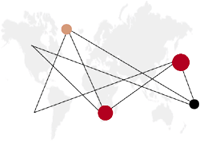
| RESOURCES | |
| 253 Kb | |
|
Higher Education in Developing Countries: from peril to promise Henry Rosovsky, David Bloom, and David Steven The educated have always been the first to value the
importance of education. As we send more of the world’s young
people to school, growing numbers knock at the doors of their country’s
universities and colleges. Standards, it argued, were often shockingly low - a product of outmoded curricula, poorly rewarded and motivated faculty, inadequate infrastructure, and a failure to ensure quality control. Students were being short-changed and societies were losing out on the development dividend that advanced education offers. The task force has called on developing country governments to act, and to do so fast. The more governments invest in basic and secondary education, the more they fuel demand for advanced courses. They must take stock of existing problems, analyse future patterns of demand, and create balanced systems of education that call on the strengths of public and private providers. Two years on and the task force's work continues to make an impact. It has received most attention on the educational front-line in developing countries. It has been read, discussed and, at times, vigorously criticised by policy-makers from around the world. The most far-reaching work has been carried out in Pakistan, which has made an impressive commitment to higher education reform. The analysis was deliberately global, offering a framework within which each country can start its unique national analysis. Pakistan's response was inspired by the leadership of task force member, Syed Babar Ali, who brought together the country's leading policy-makers, educationalists, and business people for a seminar in Lahore, at which the problems of higher education in Pakistan were explored. At the behest of the Minister of Education, the Pakistan Task Force was born. In January, after exhaustive study, it presented its findings, arguing for "the transformation of our institutions of higher education into world class seats of learning, equipped to foster high-quality education, scholarship and research, to produce enlightened citizens with strong moral and ethical values." Pervez Musharraf, Pakistan's President, has now accepted the recommendations and has initiated an implementation phase with two components. An emergency programme will apply a short sharp shock to creaking systems of management and governance. A long-term agenda will focus on curricular reform, science and technology, and building relationships between the higher education system and the rest of society. The spotlight remains on the higher education front-line. Today an international seminar called by the British Council, and supported by the Department for International Development will reach its conclusion. Policy-makers and educationalists are gathering to explore the developing world’s experience of educational reform. The Task Force said that countries need primary, secondary, and tertiary education - not one or two out of three. But the benefits of higher education - and the extent to which they accrue to an individual or the wider society - are still poorly understood and quantified. The public sector in developing countries cannot deliver higher education on its own, nor fund both expansion and quality improvements through taxation. Nor can countries rely solely on the private sector, as market failures are almost inevitable in areas such as basic science, general education, and educational access. Governments must define their role and explain what they can deliver, what they will fund, and what they can offer as facilitator and regulator. They must also make a case for what students should contribute - in money and commitment - to education. We believe that higher education is vital to building strong societies, competing in the global knowledge economy and to achieving lasting poverty reduction. But evidence is needed to stand up these beliefs. The task force aimed to start a debate, not to answer all the questions. This is a world where knowledge commands an increasing premium. The peril of developing countries falling further behind is better understood. It is now time for higher education to determine if it has the capacity and the will to deliver the promise. (Henry Rosovsky, professor emeritus at Harvard, was co-chair of the Task Force on Higher Education and Society. Harvard’s David Bloom and David Steven, from consultancy River Path Associates, will direct the British Council Seminar, From Peril to Promise. The Task Force report and news from the seminar are available at www.thfe.net) |